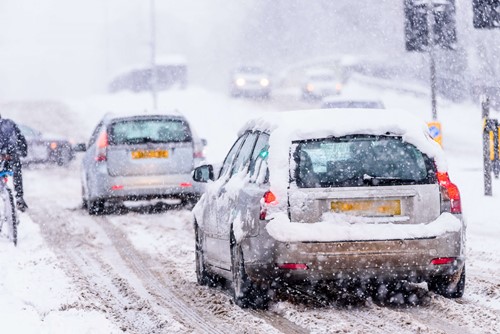As we enter into the winter season, it is important to prepare for the worst. The nights are getting darker, the chill is setting in and beginning to bite. Soon we’ll be facing frost, sleet, snow, and ice.
Preparing for these conditions in advance is a wise move, and will help your business function properly during the winter.

Dealing with travel disruptions
The biggest issue employers worry about is the impact the weather will have on employees getting to work. Snow and ice in particular present a significant risk to drivers, obscuring vision and making some roads severely hazardous.
To protect your employees from these hazards, it is worth adding a statement to your adverse weather policy regarding health & safety responsibilities when traveling to and from work.
This statement will differ depending on the industry you work in, and what you expect of your employees, but it may state anything from employees being entitled to annual leave upon their safety being compromised, to reminding employees it is their duty to take reasonable care of their own health & safety during the commute. (We’ll discuss what you should include in your adverse weather policy slightly later on)
If alternative arrangements for work can be made, such as flexible working or working from home, it is definitely worth letting your employees know this option is available to them as soon as possible.
Some alternative arrangements you could make, are:
- Allowing your workers to come in slightly later than usual
- Allow flexible working
- Offer shift swaps or overtime to workers who are able to make it into the office
- Allow homeworking while the adverse weather persists
- Allow workers to take time off as paid annual leave
Be understanding when addressing lateness and only take disciplinary action if necessary. False accusations contribute to a hostile working environment and could lead to a claim of constructive dismissal if pushed too far.
How to prepare in advance
Provide clarity to employees. Before the adverse weather really kicks in, make sure you establish contact arrangements, as well as alternative arrangements if the employee cannot make it into work, and what will happen with regard to pay if the employee cannot work.
Making sure the employee knows where they stand with these issues will ensure there is no confusion should they be unable to get into work, which in turn means there is less likely to be significant disruption.
To be extra cautious, it is worth establishing:
- How the employee should contact you if they are unable to come in
- Any alternative travel options they could utilise
- If they can work at an alternative site
- If flexible working is viable for them
- If home working is viable for them
- If it is, what jobs should they do from home
- Which jobs are urgent, and which should take priority
- Arrangements for childcare should schools close
Last, but certainly not least, you should draft an Adverse Weather Policy if you haven’t got one already.

What to include in an Adverse Weather Policy
An adverse weather policy is your best defence against hazardous weather conditions and the resulting issues.
Here’s a basic outline of the main points to cover in your policy:
1. Main Statement
Here, you should include a brief outline of what is expected of employees and what is expected of you as an employer. You can go into further details on employee and employer responsibilities in the following points. Put forward some of the potential options you may offer to employees struggling to get to work, i.e. flexible working, overtime, shift swaps, and state that staff members may discuss the possibility of one of these options with their manager, or designated individual.
2. Employee Actions
Here, state that employees are expected to attend work if viable, but that you accept it isn’t always safe to do so and therefore employees should not put themselves or others at risk. Then, reiterate the contact method you previously established with employees.
3. Employer Actions
Here, state what you will do as an employer to ensure the safety of your employees, including the promotion of the adverse weather policy. Managers should be unbiased when considering employees' situations and should not use rewards or punishments to encourage attendance. Reiterate your and your managers’ commitment to employees’ health & safety and wellbeing in detail. If you wish to give managers the power to let employees leave work early or close an office/department, state this here.
4. Notification of Closure
Here, you should state what will happen in the event a site will close. This includes how employees will be notified, as well as what they can expect in regard to receiving pay.
5. Alternative Arrangements (optional)
It is perfectly acceptable to state that any alternative arrangements should be discussed with a manager in the event of a member of staff being unable to attend work. However, it is often beneficial to go into further detail on the options available to the employee, including details on working from home, flexible working, making up time, shift swaps, overtime, and more.
6. Other Considerations (optional)
Finally, go over any other issues not covered in previous sections, such as disabled workers, essential roles in the workplace, staff who are already on leave, and where employees can get further information on adverse weather issues. (usually in a HR individual within your workplace).
Adverse or inclement weather and Issues to consider during the winter months

You need to take action whenever freezing temperatures are forecast. Keep up to date by visiting a weather service site such as the Met Office or the Highways England.
Winter driving
Be aware that ‘dawn frost’ can occur on dry surfaces when early morning dew forms and freezes on impact with the cold surface.
It can be difficult to predict when or where this condition will occur.
Be extra cautious of pedestrians walking on roads who are unable to walk at their normal pace. This is especially dangerous in heavy snow where it is difficult to see where the pavement edge is.
As a general rule, avoid sharp acceleration and braking in snow, ice and extreme rain. Drive to the conditions and reduce your speed.
Severe weather conditions
In severe weather – consider if your journey is essential
Ensure you have full visibility – clear all snow and ice from the vehicle
Prepare for you journey – Croner recommends keeping the following items in your vehicle:
- Tow rope
- A shovel
- Wellington boots
- A hazard warning triangle
- De-icing equipment
- First aid kit (in good order)
- Torch
- Blanket
- Warm clothes
- Emergency Rations (including hot drink in a flask)
- Mobile Phone (fully charged)
If you get caught in a snow drift:
- Don't leave your vehicle.
- Call your breakdown service or the emergency services and let help come to you.
- Don't run the engine to keep warm
Vehicle safety
In winter it is even more important to ensure your car or vehicle is safe and in good condition. To ensure vehicle safety, check the following items more frequently:
- Washer bottle fluid level and concentrated washer solution. DON'T use Water as this WILL freeze on-screen during extreme cold
- Cooling Water and Oil Levels
- Lights including fog lights all fully working
- Wiper Blades. These should be working and in good condition with no visible damage
- These should be in good condition with good treads and pressures set correctly
The big thaw
Avoid driving into flood waters wherever possible. Drivers can easily become trapped by rising flood waters.
It only takes six inches of water for a driver can lose control of a small vehicle. This level of water can cause damage to the vehicle or stop the vehicle running which can leave you stranded.
Avoiding contact with flood water due to pollution and contamination
During any such weather, you should monitor the local forecasts and consider the expected conditions in order to plan and prepare.
Whose responsibility is it when employees drive to work?
As an employer, you could ask yourself what your responsibilities are when workers commute to work using their own vehicles. Even if the employee does not drive to or from work, you have a moral duty to share relevant safety information with all staff that may be affected.
Imagine your employee ends up injured in a motorway crash, with their vehicle damaged beyond repair. They may have to take lengthy sick leave and look at buying a new car. If they were at fault, they could even lose their driving licence. All of this could affect their ability to get to work and to perform well, for an extended period of time.
You, as a business owner, can play a positive role in promoting driving safety awareness in the workplace. Consider the circumstances if your staff have worked from home for a lengthy period over the last two years. So much has changed - why take the risks when you can pre-empt them?
Driving for business purposes
We have seen business owners unaware they need to check what type of car insurance their workers have.
An employee will need a different kind of car insurance driving to work or driving to work.
Comprehensive insurance will usually cover them commuting to one workplace every day, or when the employee needs to be there. With hybrid working more prevalent now, daily working patterns have changed for several employees.
However, workers need business insurance if attending meetings in various locations or visiting venues for work or training purposes. Also, employers need to check if business mileage is included. An MOT is also required for vehicles over 3 years old, as absence may invalidate car insurance.
Employers must check that their staff hold business insurance for such work-related trips. If workers are involved in a road traffic accident the Police will enquire about the nature of their trip. And if they drove without business insurance, the law makes the employer also responsible.
Avoid fines and safety risks due to faulty car tyres
In winter more than any other season, faulty car tyres pose a serious safety issue. With the possibility of snow and ice looming, losing grip on the road can easily cause road accidents. Therefore, the likelihood that commuters get stopped and checked by the police on their way to work increases.
If your employees get caught driving a vehicle with faulty tires, they risk a hefty fine of £2,500, along with 3 points on their licence for each defective wheel. This can take a toll on their financial situation, their mental health and their ability to travel to their workplace.
Let us look next at what you can do to remind your workers about road safety…
Help your employees commute safely
As winter sets in, you can support your employees who are driving to work. The simplest way to do this is to send relevant information by email as part of your internal communication.
Start by advising them how to plan for their journey and for the unexpected. Remind them to check the latest weather forecast, adapt their driving to the conditions, and allow extra time to avoid the need to rush. The increased number of accidents throughout the winter months and weather conditions generally cause lengthy tailbacks.
Encourage them to put together a winter safety kit in their car, including:
- Warm blankets and clothes
- Snacks and water
- First aid kit
- Torch and spare batteries
- Snow shovel
- High visibility vest
They should also make sure their mobile phone is fully charged, and, where possible, carry spare batteries with them. This could prove crucial if they end up stranded and snowed in on a dark road or a remote location.
They could also share their location on a map application with a trusted close person, such as their next of kin. Such apps will share their latest known location. So, in case their mobile phone battery dies, this information could also be used by emergency services.
It’s a good idea to also inform your workers of the fines they risk. Check with them again that they hold the right type of car insurance. With the increased risk of road traffic accidents, you want to make sure you avoid situations that could damage both their health and your business.
School closures and emergency situations
If an employee’s child’s school closes, the employee is entitled to unpaid time off to care for a dependant. There are other situations where an employee would be entitled to time off, including:
- Caring for a disabled relative
- A partner is injured as a result of adverse weather conditions
It is key in these scenarios that clear communication between yourself and the employee is established. As soon as the employee is able, they should contact you explaining what the issue is, as well as predicting how long they believe their absence will be.
You may agree with the employee that they can take this time off as annual leave so the employee does not miss out on pay. You and the employee must agree to these terms for them to be implemented.
Managing pay during adverse weather
Legally, you are not obligated to pay employees who do not come in to work when the workplace remains open. You are obligated to pay the employee if the individual usually gets to work via employer-provided transport which doesn’t run during bad weather however, especially if they are ready and willing to work.
You are obligated to pay employees their normal pay if you choose to fully or partly close the business. Or, if the employee comes in to work but you reduce their hours.
You are also obligated to pay employees if the office closes due to the absence of essential staff members, such as line managers. Or, if staff who provide access to work premises are unable to get to work.
You may pay absent employees discretionally, who aren’t legally entitled to pay, via an informal arrangement if you wish to do so. This should be arranged prior to the adverse weather that has caused the absence. Include pay arrangements in your adverse weather policy so staff know what will happen to their pay in different conditions.

Get expert help with Croner
With the staff shortages that many industries face this year, the last thing businesses need is absences due to road safety incidents. Don’t wait until something happens, when you can act now and give your workers relevant road safety tips.
Call a Croner health & safety expert today, for further advice on how to manage your staff’s commute to work, on 0800 470 2708
Disclaimer:
This template is provided ‘as is’ and Croner Group Ltd excludes all representations, warranties, obligations and liabilities in relation to the template to the maximum extent permitted by law.
Croner Group Ltd is not liable for any errors or omissions in the template and shall not be liable for any loss, injury or damage of any kind caused by its use. Use of the template is entirely at the risk of the user and should you wish to do so then independent legal advice should be sought before use.
Use of the template will be deemed to constitute acceptance of the above terms.
Related resources
Categories
- Business Advice
- Culture & Performance
- Disciplinary & Grievances
- Dismissals & Conduct
- Employee Conduct
- Employment Contracts and Documentation
- Employment Law
- Employment Rights Bill
- End of Contract
- Equality & Discrimination
- Health & Safety
- Hiring and Managing
- Leave & Absence
- Managing Health & Safety
- Moving
- Occupational Health
- Pay & Benefits
- Recruitment
- Risk & Welfare



